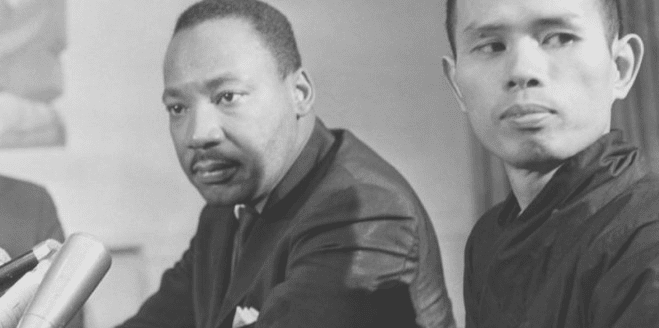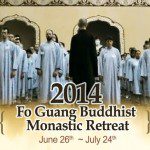
Buddhism as a philosophy often treads dangerously on two separate paths, the transcendent and the relational. Lose track of one and the other falters, inescapably. The transcendent is the goal, the path, and the suffering that leads us to it; the individual process of looking within, meditating, and coming to see both oneself and the world more clearly. The relational is the world itself, the stuff, just there; now here – the coffee that was outside me an hour ago but which is fueling my writing now; the man above, now gone for over 45 years but whose image and message are with us today and will go on well beyond our own passing.
Dr. King expresses that dimension as eloquently as anyone:
“It really boils down to this: that all life is interrelated. We are all caught in an inescapable network of mutuality, tied together into a single garment of destiny. Whatever affects one directly, affects all indirectly. We are made to live together because of the interrelated structure of reality . . . Before you finish eating breakfast in the morning, you’ve depended on more than half the world. This is the way our universe is structured, this is its interrelated quality. We aren’t going to have peace on Earth until we recognize the basic fact of the interrelated structure of all reality. “
-Dr. Martin Luther King, Jr.
1967 Christmas Sermon on Peace (via Ethan Nichtern, here)
We lose track of this interconnectedness at our peril, as my friend an fellow Patheos blogger Danny Fisher pointed out in a recent post, “No, *Let’s* Worry about Social Security: Or, On Language, Privilege, Responsibility, and Dharma Teaching.”
The other man in the image is, of course, Thich Nhat Hanh, who has expressed this truth in myriad ways himself. And it was in that year, 1967, that Dr. Martin Luther King Jr. nominated Thich Nhat Hanh for the Nobel Peace Prize. This year a movement has begun to help realize that goal and once again nominate Thich Nhat Hanh. They write:
In His Letter to the 1967 Nobel Committee he stated:
“I do not personally know of anyone more worthy of this prize than this gentle monk from Vietnam. He is an Apostle of Peace and Nonviolence ” “His ideas for peace, if applied, would build a monument to ecumenism, to world brotherhood, to humanity” – Dr. Martin Luther King Jr.
Find out more here.
Another message that needs to be shared comes from the Southern Poverty Law Center. For, as nice as it would be to see Dr. King’s nomination of Thay come to fruition, it is far more important that the underlying values of both become more clearly our own values. So if you do go over and spend some time and energy promoting Thich Nhat Hanh for the Nobel Peace Prize, please spend at least as much time supporting local, national, or international programs that work to eradicate poverty.

|
Dear Justin Sloan,
As I sit in my office looking out at the church where Dr. Martin Luther King Jr. preached during the civil rights movement, I’m reminded of something he said that addressed longstanding attitudes about the plight of America’s poor:
“It’s all right to tell a man to lift himself by his own bootstraps,” Dr. King said, “but it is cruel jest to say to a bootless man that he ought to lift himself by his own bootstraps.”
His words are particularly relevant today – 50 years after President Lyndon B. Johnson declared war on poverty. Johnson’s initiatives have helped millions of Americans, including our senior citizens, stay afloat by providing a floor of support for nutrition, health care, and other basic necessities.
But today, during a period of income and wealth disparity not seen in nearly a century, what we’re seeing is not a war on poverty, but rather a war on the poor.
We’re being told by many politicians and pundits on the right – as they seek to shred our country’s safety net – that the poor, in effect, deserve their fate, that the jobless are lazy and don’t want to work, that immigrants come to our shores for handouts, and that the sick and the elderly should fend for themselves.
Meanwhile – as economic gains increasingly flow to the rich – poor and middle-class Americans are falling further behind. In 2012, for instance, the wealthiest 10 percent earned more than half of all income.
Something is terribly wrong – and getting worse. As the Associated Press recently put it, “The gulf between the richest 1 percent and the rest of America is the widest it’s been since the Roaring ‘20s.”
At the SPLC, we’ve always been concerned about poverty. Indeed, it’s in our name – the Southern Poverty Law Center.
In the earlier days, we fought in the courts to help poor, minority communities get their fair share of public resources and services. More recently, we’ve represented some the country’s most marginalized people – the exploited migrant workers and immigrants who labor in our fields to put food on our tables.
Right now, we are fighting for disadvantaged children in Alabama’s impoverished Black Belt region who are trapped in failing schools while the state provides tax breaks to families who are able to send their children to private or successful public schools.
Our mission is to be there for those who have no other champion.
At the time of his assassination, Dr. King was in Memphis to support striking sanitation workers and was organizing a “Poor People’s Campaign” to call attention to poverty and economic injustice.
Today, we need to rededicate ourselves to Dr. King’s dream of economic justice and to helping those who are “bootless” in our country. America, he said, has “the techniques and the resources to get rid of poverty. The real question is whether we have the will.”
 |
|
Sincerely,
 Morris Dees Morris Dees
Founder, Southern Poverty Law Center |
|
|
As with any great figure, Dr. King will be seen from a variety of perspectives. It’s our job to learn to see them all. Here are a few worth reading (more are welcome in the comments section):
- Chris Henrichsen at Approaching Justice (2013) here.
- Hamden Rice on Dr. King’s legacy at DailyKos (2011) here.
- Charles R. Johnson at Shambhala Sun (2005) here.
Be first in love… be first in moral excellence… be first in generosity.














